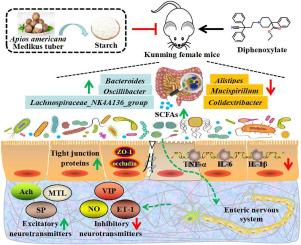美洲Apios Medikus块茎淀粉通过调节小鼠的神经递质和肠道微生物群来减轻地苯诺特诱导的便秘
IF 5.9
1区 农林科学
Q1 FOOD SCIENCE & TECHNOLOGY
引用次数: 0
摘要
抗性淀粉(RS)作为肠道菌群的调节剂,对排便困难具有显著的治疗效果。本研究探讨了美洲Apios Medikus块茎淀粉(Apios americana Medikus tuber starch, AS)对苯基诺特致小鼠便秘的新型益生元作用。AS为典型的b型晶型,RS含量高达87.25%。高剂量AS- h处理后,便秘小鼠湿重、黑粪数和胃肠道转运率分别较模型组显著提高57.5%、242.9%和33.9%。此外,补充as - h可显著抑制便秘小鼠结肠组织中肿瘤坏死因子-α (TNF-α)、白细胞介素-6 (IL-6)和白细胞介素-1β (IL-1β)等炎症相关因子的水平,以及occludin和zoonula occludin蛋白表达水平的升高。AS-H组兴奋性神经递质明显增加,抑制性神经递质明显减少。此外,AS-H处理显著抑制了结肠血管活性肠肽受体1 (VIPR1)的表达,而5-羟色胺受体4 (5-HT4)的表达增强。as - h治疗后,肠道细菌属水平(如Bacteroides, Lachnospiraceae_NK4A136_group和Oscillibacter)显著增加,同时scfa浓度增加,这些变化与便秘的缓解直接相关。重要的是,使用as衍生的微生物组进行粪便微生物群移植(FMT)干预可显著改善便秘小鼠的粪便参数。总的来说,补充AS可以通过调节小鼠肠道神经递质和肠道微生物群来促进粪便排泄,为后续的人体临床试验提供依据。本文章由计算机程序翻译,如有差异,请以英文原文为准。

Apios americana Medikus tuber starch alleviates diphenoxylate-induced constipation by modulating neurotransmitters and gut microbiota in mice
As the modulator of gut microbiota, resistant starch (RS) demonstrates the significant therapeutic efficacy against difficult defecation. This study investigated the novel prebiotic effects of Apios americana Medikus tuber starch (AS) on diphenoxylate-induced constipation in mice. AS was characterized by a typical B-type crystalline pattern with a high RS content of 87.25 %. Treatment with the high dosage of AS (AS-H), the wet weight and number of black feces, and gastrointestinal transit ratio of constipated mice significantly enhanced by 57.5 %, 242.9 % and 33.9 %, respectively, in comparison with the model group. Moreover, AS-H supplementation significantly inhibited the levels of inflammation-related factors including tumor necrosis factor-α (TNF-α), interleukin-6 (IL-6) and interleukin-1β (IL-1β) as well as the increased protein expression levels of zonula occluden-1 (ZO-1) and occludin in the colon tissue of constipated mice. AS-H group showed marked increases in the excitatory neurotransmitters with concurrent decreases in the inhibitory neurotransmitters. Additionally, the colonic expression of vasoactive intestinal peptide receptor 1 (VIPR1) was significantly suppressed, while serotonin receptor 4 (5-HT4) was enhanced by AS-H treatment. A significant increase at gut bacterial genus level (such as Bacteroides, Lachnospiraceae_NK4A136_group and Oscillibacter) accompanied by increasing concentrations of SCFAs was observed after AS-H treatment, with these changes directly correlating to the alleviation of constipation. Importantly, fecal microbiota transplantation (FMT) intervention with a AS-derived microbiome notably ameliorated the fecal parameters in constipated mice. Collectively, supplementation with AS could promote the fecal excretion by modulating enteric neurotransmitters and gut microbiota in mice, providing the conduct of subsequent human clinical trials.
求助全文
通过发布文献求助,成功后即可免费获取论文全文。
去求助
来源期刊

Food Bioscience
Biochemistry, Genetics and Molecular Biology-Biochemistry
CiteScore
6.40
自引率
5.80%
发文量
671
审稿时长
27 days
期刊介绍:
Food Bioscience is a peer-reviewed journal that aims to provide a forum for recent developments in the field of bio-related food research. The journal focuses on both fundamental and applied research worldwide, with special attention to ethnic and cultural aspects of food bioresearch.
 求助内容:
求助内容: 应助结果提醒方式:
应助结果提醒方式:


